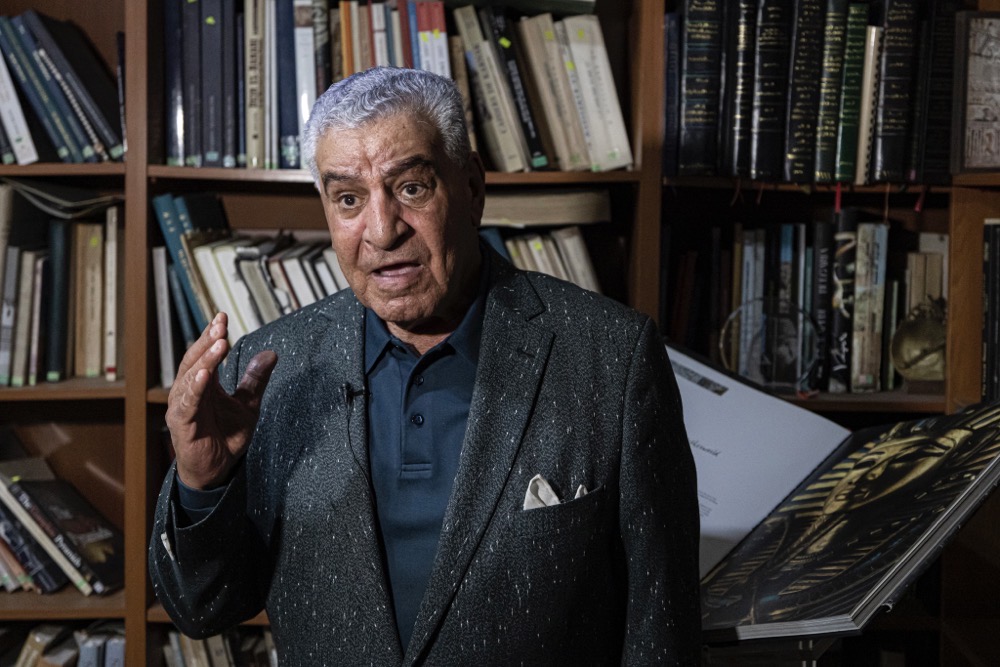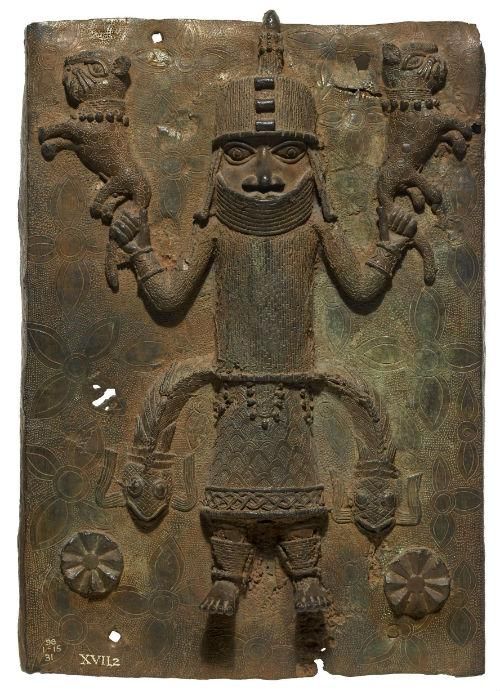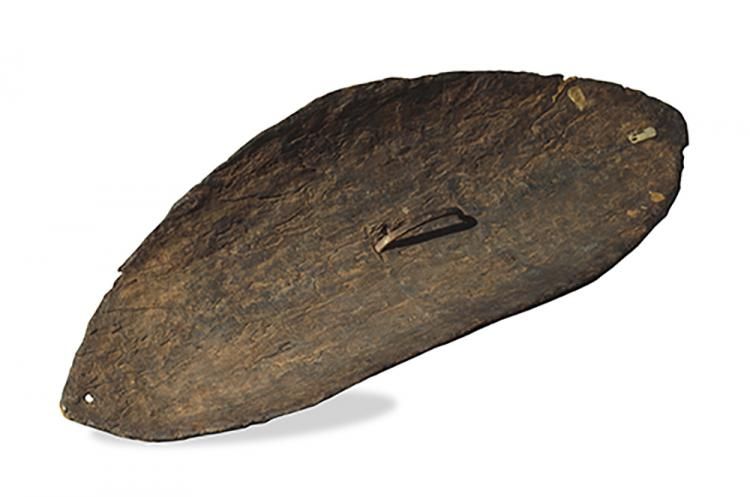IRBIL, Iraqi Kurdistan/CAIRO/LONDON: The British Museum in London, one of the world’s foremost exhibitors of historical and cultural artifacts, is mired in controversy over the theft of valuable items from its collections and a failure by museum officials to properly investigate, forcing its director to resign.
The irony of the British Museum falling victim to thievery has not been lost on those nations around the globe who have long accused the institution of displaying — and refusing to return — a vast bounty of treasures looted over several centuries of British imperial expansion.
The controversy has once again raised pertinent questions over the museum’s right to exclusively possess and exhibit such artifacts from various ancient civilizations and countries worldwide when it cannot guarantee their preservation or protection.
Zahi Hawass, Egypt’s most renowned archaeologist and former minister of state for antiquities affairs, told Arab News: “What happened in the British Museum is a crime by all standards.
“The presence of Egyptian antiquities in American or European museums or anywhere in the world does not mean that they own these antiquities.”
He said such items would be far better protected, carefully catalogued, and properly restored in their place of origin.
Up to 2,000 artifacts, ranging from gold jewelry to rare gems and semi-precious stones dating from the 15th century B.C. to the 19th century, were stolen from the British Museum’s storeroom over several years, aided and abetted by a lack of proper cataloguing or registration.
The museum’s director, Hartwig Fischer, said he would step down after admitting failures in investigating the thefts. However, his resignation has done little to assuage the concerns of those nations with precious artifacts in the museum’s possession.
“The theft of artifacts from the British Museum and the resulting investigation of its former director is considered a crime against the whole world,” Hawass added.

The ex-politician has in recent years made significant archaeological discoveries throughout Egypt, including a major find at Saqqara necropolis in October 2020.
He said: “Because stealing antiquities from a museum in this way is unreasonable, I ask that Egypt issue a popular demand that this museum does not deserve to display Egyptian antiquities in it.
“It is owned by Egypt, and Egypt must protect its property from theft or improper restoration operations.
“We affirm that the presence of the Rosetta Stone inside the British Museum is a grave mistake because this stone is the icon of Egyptian antiquities, and its place must be in Egypt.
“I also demand that UNESCO and the Ministry of Tourism and Antiquities hold an international conference to find out the possibility of withdrawing our antiquities from the British Museum,” Hawass added.
A British Museum spokesperson told Arab News it had “received no formal request from the Egyptian government to repatriate the Rosetta Stone.”
The spokesperson said: “The British Museum works with partners all over the world including with colleagues throughout Egypt on projects, exhibitions, and research and we enjoy a long-standing and collaborative relationship with the Egyptian Ministry of Antiquities.”

Zahi Hawass, Egypt’s most renowned archaeologist and former minister of state for antiquities affairs, told Arab News: “What happened in the British Museum is a crime by all standards. (AFP/File)
The museum acknowledged the sensitivities surrounding the restitution of items “which are looked after” by the institution and others like it around the world, the spokesperson added.
“The British Museum understands and recognizes the significance of the issues surrounding the return of objects, and works with communities, colleagues, and museums across the globe to share the collection as widely as possible.
“The debate about restitution raises important and nuanced questions around objects and collections which are looked after in many countries around the world.
“The British Museum fully acknowledges the complex histories of objects within the collection and recognizes our responsibility to engage audiences about their interconnected history in the modern world,” the spokesperson said.
In relation to the recent thefts, museum chair George Osborne, a former British finance minister, was quoted by Reuters denying any suggestion there had been a cover-up in light of the museum rejecting a warning two years ago.
In an Aug. 16 press release, he said the museum’s trustees “have taken decisive action to deal with the situation” and “set up an independent review into what happened and lessons to learn, and used all the disciplinary powers available to us to deal with the individual we believe to be responsible.”

The controversy has once again raised pertinent questions over the museum’s right to exclusively possess and exhibit such artifacts from various ancient civilizations and countries worldwide when it cannot guarantee their preservation or protection. (Shutterstock)
Osborne admitted the possibility of “potential group think” in the institution, which could not even conceive of an insider pilfering from its vast and priceless collection. He also conceded that the thefts had “certainly been damaging” to the museum’s reputation as a trusted place to store and exhibit many valuable relics.
His admission may seem like an understatement. After all, the museum has justified the possession of its vast collection on the basis that it is safer in the museum’s hands compared to many of their areas of origin, especially conflict-ridden parts of Africa and the Middle East.
That justification, at times, appeared to be validated in recent years, at least on a surface level. For example, when Daesh rampaged across Iraq and Syria between 2014 and 2019, it intentionally destroyed numerous artifacts in the Mosul Museum and sold others it had looted from such sites on the black market to fund its terrorist activities.
Iraq has since rebuilt the Mosul Museum following the city’s liberation in July 2017 and recently reopened the national museum in Baghdad, which was infamously looted in 2003.
In May, Iraqi President Abdul Latif Rashid announced the recovery of 6,000 artifacts, dating back to several phases of Iraqi civilizations, that had been on loan to the British Museum in the 1920s for study but were never returned.

Benin Bronzes. (British Museum)
Similar cases of the destruction have occurred elsewhere. In 2012, Al-Qaeda overran the ancient city of Timbuktu in Mali and intentionally destroyed its centuries-old manuscripts. UNESCO has dubbed such intentional destruction of world heritage sites and artifacts “cultural cleansing.”
When he was mayor of London in 2015, former British Prime Minister Boris Johnson pointed to such cultural cleansing as a justification for, among other things, the removal of the Elgin Marbles from the Parthenon in Greece two centuries ago, which remain in the British Museum to the present day.
His reference to the Elgin Marbles, in particular, was bizarre since Daesh had overrun large parts of the Middle East, not Greece.
The sculptures were removed from the Parthenon’s wall in Athens in the early 19th century, when Greece was under the control of the Ottoman Empire, by the Seventh Earl of Elgin, an antique collector and British diplomat.
Following their removal, under questionable legal and ethical circumstances, the British government bought the artifacts and duly handed them over to the British Museum in 1816.
Their removal continues to rankle Greece and Greeks alike. When the new Acropolis Museum in Athens opened in the late 2000s, it featured a display depicting where the Elgin Marbles would be placed if Britain ever decided to return them. That display aptly demonstrated how their removal essentially continues to disfigure a world heritage site.

Hartwig Fischer, director of the museum, has resigned. (Shutterstock/File)
Assertions like Johnson’s justifying the UK retaining them more than two centuries later arguably ring hollow after the recent revelations of theft.
“We want to tell the British Museum that they cannot anymore say that Greek (cultural) heritage is more protected in the British Museum,” Despina Koutsoumba, head of the Association of Greek Archaeologists, told the BBC.
In a recent interview with the Greek newspaper To Vima, Greece’s Minister of Culture Lina Mendoni said the security questions raised by the missing objects “reinforces the permanent and just demand of our country for the definitive return” of the Elgin Marbles.
“The loss, theft, and deterioration of objects from a museum’s collections is an extremely serious and particularly sad event. In fact, when this happens from within, beyond any moral and criminal responsibility, a major question arises regarding the credibility of the museum organization itself,” she added.

Gweagal shield. (British Museum)
The return of artifacts from UK museums is not without precedent. The Benin Bronzes — thousands of looted items in European collections — are in the process of being repatriated to Nigeria, having been taken by British forces during the sacking of Benin City in 1897.
The British Museum is also home to several other contested objects, including Aboriginal artifacts from Australia, the Maqdala collection from Ethiopia, Hoa Hakananai’a of Easter Island, and the Cyrus Cylinder of the Persian Empire.
Iran’s last shah extolled the cylinder as proof of Persia’s progression, invariably describing it as the first bill of rights or human rights charter thousands of years before America’s.
In a clear reference to the British Museum, he once told a British reporter: “You have the real scroll in your museum. You took it from us.”
Events of the past week and revelations of negligence potentially dating back many years make the present moment ideal for objectively reassessing the wisdom of having so many of the world’s treasures and historical artifacts under one roof.

















